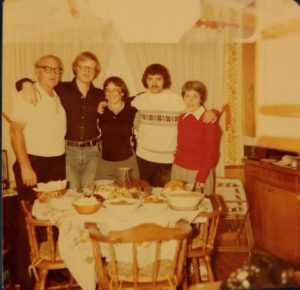Journeys to Humanism: Leaving Religion, Retaining Morality

Journeys to Humanism, theHumanist.com’s regular series, features real stories from humanists in our community. From heartwarming narratives of growth, to more difficult journeys, our readers open up about their experiences coming to humanism.
Bill Robinson
Beaumont, TX
Unlike physical journeys, I believe journeys of ideas and beliefs have not just one starting point, but several interacting ones that shape one’s journey. My personal starting points were:
1. Being raised in a loving and very strongly Christian home. I saw the best of what a Christian can be in the lives of my parents in terms of marriage, child-rearing, and the treatment of others.
2. Having a father who not only tolerated disagreements in politics and social issues but enjoyed talking about them with me. Even after I let him know I did not believe in the existence of God he encouraged me to defend what I believed no matter who disagreed—and was proud when I did so, even though this particular disagreement bothered him greatly.
3. Having a mother who liked to read and who passed on to me her love of reading.
4. Being raised in an upper middle class family with access to libraries, good schools, and not wanting for the material necessities of life.
All of the above gave me a good moral foundation, a safe place in which to question, and the resources I needed to do so. These multiple starting points coalesced into the start of my journey to humanism at fifteen. I was rereading the story of Pharaoh and Moses and was bothered by the morality of a God hardening the Pharaoh’s heart for God’s glory.
I saw the lack of morality in this action and began questioning the morality behind God’s other actions–Joshua and genocide, the flood, and on and on.
From there, I became more liberal and practiced a much less literal version of Christianity and understanding of the Bible. This new understanding allowed me to also accept the findings of science in regards to evolution, the age of the universe, and so forth. Then came the philosophical questions.
These ranged from things such as, how can God justify condemning someone to hell who has never even heard of him to how can God be both omnipotent and also allow humanity free will? And how can an omnipotent and omniscient God allow evil in all its forms to exist?
As the years went by I also learned more about other religions and how people strongly tend to stay in some version of the religion they were born into. I realized that each religion claimed that they could experience the truth of their own gods and beliefs.
By the time I started college, I was questioning my liberal Christianity. However, I continued learning from others, either in the form of lectures, discussions, or written work. Learning about how and why science works as well as it does was especially influential in my thinking. By the end of my first year of college, I no longer found the “evidence” for some of the things I believed nearly as convincing as I once did. I also was an atheist.
But atheism and humanism are not the same. Just like theism encompasses many different ways of believing in god(s), so too are there many different ways of being an atheist. One of my greatest fears in my journey is that my questioning of God and my whole belief system would leave me in a place that provided no support for morality.
I made a decision then that the truth (or as close as I could get to it) was important enough to me that it was worth this risk. That I would deal with the results of my journey whatever they might be.
Fortunately, I came across a system of thoughts and beliefs that valued rational thinking, evidence, science, and most importantly, humanity. From the Humanist Manifesto II:
• “We affirm that moral values derive their source from human experience. Ethics is autonomous and situational needing no theological or ideological sanction. Ethics stems from human need and interest.”
• “Reason and intelligence are the most effective instruments that humankind possesses. There is no substitute: neither faith nor passion suffices in itself.… But reason must be tempered by humility, since no group has a monopoly of wisdom or virtue.”
While this did not complete my journey, as these sorts of journeys are never completed till we die, this did provide me with the stable platform I needed at nineteen. And it has continued to inform and support me for this now forty-seven-year journey. And will, I believe, continue to do so until my journey ends.
We all have our own stories of how we came to be humanists, and we want to hear yours! Fill out the form here to be featured in this series.
